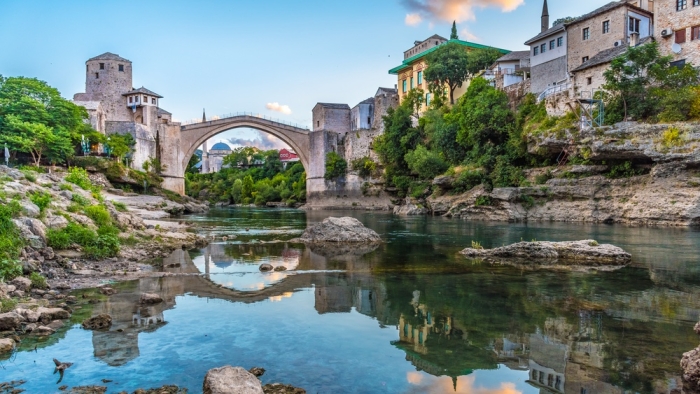In the city of Mostar on the blue-green River Neretva in southern Bosnia the old Ottoman footbridge, one of the most famous and beautiful of its kind in the world, has been rebuilt, after it was destroyed by shellfire from Croat tanks during the 1992-1995 war.
On the road into town the destroyed houses, which once stood with masonry gouged out of them like rows of rotten teeth, have been rebuilt - many of them with European Union money - and the piles of rubble long cleared away.
But in the minds - and bodies - of the people who still live there, the Bosnian war, which began 30 years ago next month and claimed the lives of at least 100,000 victims, lives on.
"The whole thing is very difficult emotionally. People meet the killers of their loved ones every day. In the hairdressers, in supermarkets, in the most ordinary of places."
When the Bosnian war ended with a cease-fire in December 1995, after three and a half years of fighting, the guns fell silent. The Dayton Peace Accord, signed by the leaders of the different nationalities, aimed to bring about hope for a brighter future. But the animosities that had been stirred up still live on to this day.
Some communities are now mixed, but in many the Serbs, Bosniak Muslims and Croats live parallel lives, barely crossing into each other's sections of town, or sharing the same cafes.
At the heart of the division are different historical narratives. The Bosniak Muslims, who lost by far the most people in the war and were ethnically cleansed from large swathes of Bosnia, see themselves as the chief victims. Most international observers agree.
The most sensitive case in point is Srebrenica where Serb soldiers and paramilitaries killed around 8,000 Muslim men and teenaged boys in what was the worst massacre in Europe since World War 2.
But Serbs say to call it a genocide - a verdict handed down by the Hague - is inaccurate.
"It is not genocide," said Lola, a Serb and former combatant now living in Sarajevo. "The women and children were spared."
On the day set aside to commemorate Srebrenica, July 11th, Vildana said the local Serbs are often disrespectful, even provocative.
Five hours drive north of Mostar in Banka Luka, the de facto capital of the Bosnia Serbs, locals see the war very differently. While admitting that they committed crimes, they prefer to lay the emphasis on World War 2 concentration camps in which Serbs and Jews were the primary victims of Croats allied to the German Nazis.
Danilo, president of the local Serb student parliament, was one of many Serbs who said that his people had suffered greatly and did not deserve to be singled out for blame.
Srdjan Puhalo, a psychologist in Banja Luka, was one of very few Serbs who accepted the validity of the genocide verdict against his people handed down by the international court.
He said: "We are really hospitable and emotional people. But we also know how to go for blood."
Mr Puhalo said that 30 years after the war Bosnian society had barely begun to recover from its trauma but that there were very few willing to admit to having mental problems
"PTSD is a stigma," he said. "It's more acceptable to be an alcoholic or to beat your wife than have PTSD."
Casting a further shadow over Bosnia is the new war in Ukraine which is opening old wounds. There were reports of panic buying across Bosnia as news spread that the war had broken out, despite the fact that it is hundreds of miles away.
"My grandmother told me that everything started here like in Ukraine," Vildana said. "Nobody believed that there could actually be a war. They started buying everything here, especially flour."
Mr Puhalo said that it was only natural that the Ukraine war was bringing up old fears.
"PTSD is in all of us," he said. "The morning Russia attacked Ukraine masses of people became totally messed up. There was sadness, worry, anger and helplessness."
Most say that Bosnia, however, despite some nationalist tensions, is unlikely to erupt into violence again.
Others are simply fed up with everything to do with war both past and present and want to get out.
Armin, 26, is studying to be an English interpreter in Sarajevo, the Bosnian capital. All he wants to do is leave. "Nationalism is freezing the country," he said. "And we will always have problems because of it."









